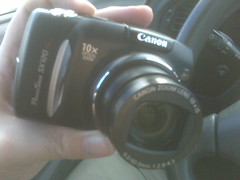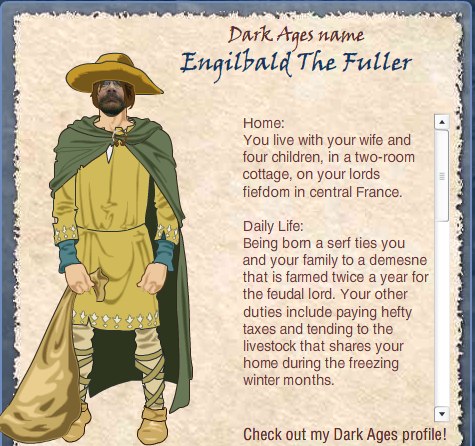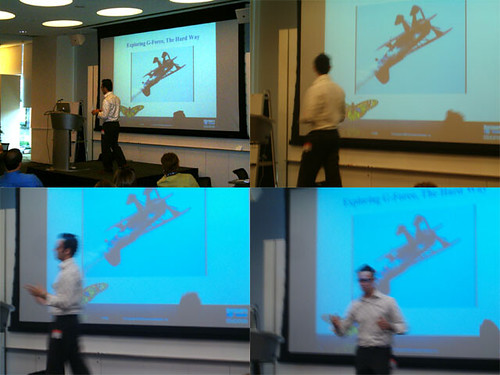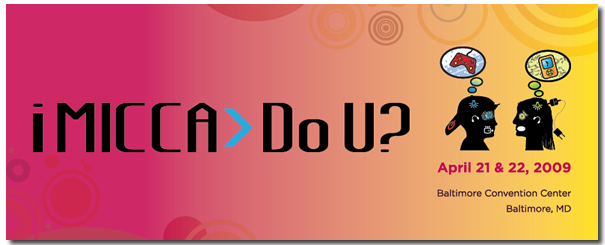Wednesday, December 30, 2009
New toy.
Used some Christmas cash from my parents to buy my first digital camera in years - A Canon PowerShot SX120 IS.
10x optical zoom, full manual mode, 10 megapixels, AND it still fits in my pocket since that wonderful zoom lens retracts almost completely into the body.
Does this mean I'll be taking more pictures (and ones that aren't from a blurry little cameraphone) this year?
Oh, I hope so.
Sent from my Verizon Wireless BlackBerry
Saturday, November 14, 2009
PUWT Bingo
That being said, here's some things that I've encountered at every conference I've ever attended (click to make it bigger):

There's some good and bad in there - there always is - but if you look you'll see the good vastly outweighs the bad.
And that's something that helps make it awesome.
Tuesday, August 11, 2009
Things to do at the new job:
- Start Monday. (Woohoo!)
- Use no textbooks. Textbooks, especially ones about technology, seem like they're out of date before they're shipped.
- Avoid handouts whenever possible. Papers have an annoying habit of getting lost, "lost," or simply ignored. Also, I've never seen a school copier go more than 4 weeks without having a spectacular meltdown. Handouts have their uses, but I refuse to be one of the teachers staring at a copier exuding the magic blue smoke 5 minutes before class and wondering what I'll do now that my entire day's lesson plans are shot.
- Avoid paper whenever possible. When I first played with the form feature in Google Docs, my initial thought was "I could use this to build a test!" I don't think I'll be using Google Docs for everything, but I will find ways for students to hand their work into me digitally. I'm looking at a Drupal installation for this at the moment, though I might play with Moodle if Drupal doesn't fit the bill.
- Use wikis. They're easy to update, tamper resistant, and can replace textbooks and handouts in my classroom. The best part is I expect my students to have a sense of ownership if they know that they helped make the class "textbook."
- Tie art in with everything. It's an art class. It's a computer class. It's both. I intend to keep it that way. The technology aspect is hard to avoid when teaching in a computer lab, but one can lose sight of the art when dealing with MS Word.
- Avoid busywork. As any former substitute will tell you, a class can sense fear. They can also sense when you're wasting their time. Every lesson I plan will have me asking "When will they need to know this?" I'll ask, because my students will be asking as well.
- Have students blog. Maybe not every day. Maybe not every class. Maybe not in a way that allows the whole world to see everything they write, but every day people are using social networking platforms in ways that will hurt them in the long run. One of my goals is to teach them how to do it responsibly.
- Blog more. This is a new position with a very open curriculum. There are frameworks in place, of course, but I have a lot of freedom and that means I'll be trying a lot of new ideas. I intend to share what does and doesn't work.
Sunday, July 12, 2009
On the new position

Things I will miss:
- The students. Sure, there will be students at the new building, But I feel this way every time I lose a building. This doesn't get easier through repetition.
- The staff. With some exceptions, the staff (and not just the teachers!) in all of my buildings were joys to work with.
- Getting my hands dirty. There's nothing like a good ceramics project. Or painting project. Or any media that requires a sink.
- The local community. The town surrounding my base school is on my top 10 list of places to live.
- The mobility. As an itinerant teacher I got to visit 60+ classrooms a year. For all its drawbacks, that was a great opportunity to observe vastly different learning styles and take the best from each. I am certain it has made me a better teacher.
Things I won't miss:
- Waking up in the morning and wondering, in my state of "not quite awake"-ness if I'm at the 7 AM building today, and therefore late, or the 8 AM building, and therefore will get there on time. (Then usually I would look at my clock and realize it was 2 AM and I should really go back to sleep.)
- Being required to make other teachers complete certain tasks without the authority to make them complete those tasks. I will not go into details here.
- Only seeing my students four or five times a year.
- Having my office / storage area consist of half the conference room, separated by a temporary wall that blocked no sound whatsoever. (I wore headphones for multiple reasons.)
Thursday, July 09, 2009
What I did this Summer
- Spend lots of time blogging.
- Go to technology conferences.
- Spend lots of time with my PLN.
What I did do:
- Unplugged and spent quality time with the wife.
- Plugged back in to play video games ... with the wife.
- Got a job offer for an art/tech position where I will have my own computer lab and see my students much more often than once or twice a quarter. It's in a new K-8 school opening this year in the county.
- Had an interview the next day.
- Offered the job on the same day.
- Asked what the administration's take was on blogging.
- Convinced administration that I could teach blogging to students in a responsible way.
- Accepted the job.
- Missed my exit on the way home from the interview. Twice.
Those that know me will understand this was a decision that I was ready to make, but it still won't be easy. There are a lot of staff and students in my previous buildings (dang, it's still feels odd typing that) that I'm really going to miss. Most of them I didn't even get a chance to say goodbye to.
I think I'm going to let this sink in for a day or two.
Wednesday, June 17, 2009
Hey, I know that guy!
Scott Kinney, Vice President at Discovery Education, at a hearing regarding the Future of Learning: How Technology is Transforming Public Schools on June 16, 2009.
Tuesday, June 16, 2009
On Language
Yeah, you can say I'm a stickler about some things. It's genetic, I think. Just try ending a sentence with a preposition when my sister's around.
I'm critical about this because one of the things we teach in school (according to our curriculum, at least) is how to communicate well. People who speak "properly" are more likely to do well in interviews and score higher paying and/or better quality careers.
But it's not the only way people speak. I dare you to turn on a radio and count how many times the word "ain't" is used in one hour's worth of song lyrics. There, it's acceptable. In school, it's not.
It gets worse when you head online, where sentences like "LOL school is teh suxxorz I hav a gud job even wit low gradez." are easily understood and not criticized for grammar or spelling ... in some circles.
"In some circles" is apparently the key phrase here. In art we need to know our target audience, and we use our works, whether they're visual, auditory, or something else, to communicate something. I'm not likely to use Modernism to illustrate a children's story about a young boy's first week at school.
But online we have a wide variety of audiences with which we can participate, and the language norms can be incredibly different in each tab of our browser. Several people I follow on Plurk and Twitter are fans of some strangely talking cats, but you still won't see us posting things like "I can has Summer vacation!" or "Invisible budget" in our Professional Learning Networks.
So, if you remember how I started this post it's safe to say I'm not in favor of students handing in essays written in 1337 or LoLspeak, even though I'm capable of communicating in both. But I'm not so quick to dismiss these offshoots of the English language. They were created by a generation that found themselves understanding the new technology far better than most of their teachers, so they built their own rules around it.
And if you look at it that way, it kinda roxxorz.
Tuesday, June 02, 2009
Monday, June 01, 2009
On Employment.
Whether or not it happens, I have been thinking a bit about my little corner of the internet and its effects on my chances of getting hired. I know some bloggers use assumed names so they just don't ave to worry about that. Too late for me, since last I checked googling the quite common name of "Aaron Smith" got me this result.
It is my hope, my dream, that schools with the right idea about both the arts and technology will see my ramblings here and think I am someone worth keeping in their employ.
I am also hopeful (though slightly less so) that the opposite is true - that schools with the wrong attitude towards the arts and technology will look upon my works and despair (sorry, couldn't resist the literary reference) write me off as someone they wouldn't want. But then, somehow I doubt those kinds of schools would bother looking at my website in the first place.
But mostly, I'm hoping that I don't have to look for a job in the first place. It is a big scary world out there and I've yet to recieve my renewed teaching certificate (completed the last requirement in December) in the mail. I know I was thinking of changing careers, but for some reason now does not seem the time for risk taking.
Thursday, April 30, 2009
Tumblr Tumbles
"Self, you don't have enough accounts on web 2.0 type websites. You should go find another."
So I went and started a Tumblr page.
OK, that's not true.
The real reason was because on a semi-recent (actually kinda old ... I'm a little behind) episode of Net @ Nite it was mentioned that Tumblr allowed you to use your phone to call in audio that would be posted directly to your Tumblr page.
Sound familiar? Yeah, it's what Gcast lets you do, only unlike Gcast they haven't started charging for that feature yet.
Well ... I was underimpressed, to say the least.
There was no option to hear your recording before posting it live to the internet. I'm someone who usually needs at least one do-over when it comes to recording anything, and I see how this could go very, very wrong.
Also, I know phone calls are by default low quality audio, but I think they may have compressed the file even beyond that. I assume this was in the name of conserving as much bandwidth as possible, and considering Tumblr's popularity I understand that could be a big issue.
Unfortunately, the final nail in the coffin was that the resulting RSS feed didn't have an enclosure. That's geek-speak for "It may be audio on the web, but iTunes will never let it be a podcast." Except for certain thinking-outside-the-box uses, this is not a Gcast replacement.
The rest of Tumblr was a collection of ups and downs. The service is a miniblog, as it allows more than microblogs like Twitter but it's not nearly as full-featured as WordPress. They have multiple posting methods, whether from their web interface dashboard (seen above) a variety of apps via their API, or their bookmarklet, which I have to say is one of the slickest (and ironically, feature rich) ones I've seen so far. Still, nothing they had really jumped out at me as being better than the other services I was already using.
And then I decided to search through the Tumblr community to see what I could find in the way of educators, and I discovered that I'm not likely to recommend this service any time soon. At least, not until they include a Google-like safe search feature. I found too much that I would be embarrassed to have to explain if a student showed it to me in class, and that was while looking for teachers!
My final take? If all of your friends are using Tumblr go ahead and make an account. If you want a free blog? There's plenty that are better. Want a microblog PLN? Go with Plurk or Twitter. Picture posting? Flickr. Cool links? Del.icio.us or Diigo.
But don't bother with Tumblr, it really doesn't seem to be worth it yet.
Wednesday, April 22, 2009
10 Ways To Be A Better Presenter
Having survived my 4th consecutive year presenting at MICCA & a few other places, I think it's safe for me to say I know one or two things about it. At least, I've yet to have a session that ended emptier than when it started, so I've got that going for me.
So here's a list of 10 things that, if done correctly, will help your audience stay engaged and secure in the fact that you know what you're talking about. (Or at the very least, they'll help you fake it.)
They're numbered, but the order could be changed. I'm not giving much thought to that part.
10. Market yourself. Don't spend too much time on this, but your audience should know why you're worth listening to on this subject. Are you a DEN Star? Google Certified? Do you have 20 years experience working with Web 2.0 technology? (OK, maybe in dog years...) Spend 30 seconds telling them why you're special. Letting them know how to contact you if they have more questions later is good, too.
9. Don't sit down. Some people can get away with it, but most of us can't. An enthusiastic presenter is more likely to capture an audience, and you can show your enthusiasm better while up and moving.
8. Podiums are walls. Even if they aren't the big, bulky, "This could stop a truck and still be usable" podiums, they create a barrier between you and your audience. Don't hide behind one unless you audience scares you. (In fact, don't use one then, either. Audiences can smell fear.)
7. PowerPoint is there to back you up. Not the other way around. Substitute "PowerPoint" for "Keynote," "Prezi," "Google Presentation," or whatever you intend to use. If all you're doing is reading your slides, you're wasting space, time, and potentially oxygen.
6. Limit yourself. Just because a product or service can do 53,781 different things does not mean you have to cover all of them. Tying in with #7: Just because PowerPoint has a plethora of transitions does not mean you should try to use all of them in a single session. "Random" is the worst possible transition choice ever. In both cases, you should pick your favorites and stick with those.
5. Ask questions. Your audience is full of intelligent people. (Granted they're listening to you, but there's no reason to let them know that's a strike against them!) The questions you ask could be ones that just check to see if they're paying attention or ones that change the course of your discussion topic, but they should have some way of knowing that you're acknowledging their presence.
4. Don't print your PowerPoint. I'm not just saying that because as I type this it's Earth Day. I'm saying this because paper is made of matter. The science geeks out there (including me) will be happy to tell you that means it has mass and volume, and that means 2 reasons why your audience will resent your 10 page printout once it's added to all the other printouts they've collected at that conference. It adds up and shoulder pain is serious business. Do them and yourself a favor and make a wiki with all the useful information on it. Share the link at the beginning and end of your presentation and everyone will be happier for it.
3. Don't admit mistakes that don't mater, but admit the ones that do. So you wanted to cover 21 different Web 2.0 sites and skipped #17? Forget about it. If you have a wiki (you read #5, right?) they'll be able to find ay small points you missed on there. But remember that with the exception of my 2nd grade teacher, we're all human. Breathe deep, correct it if you can, acknowledge it if you can't, and move on. Your audience will respect you more or it, trust me.
2. Have a backup. PowerPoint will crash. The network will go down. Something will go horribly wrong if you don't have a plan B. When I'm talking about websites I'll usually have screen captures of all the features I want to showcase, just in case. I learned this lesson the hard way. I will not share that story.
1. Your presentation will never be finished. I've seen keynote speakers changing slides shortly before they presented. I myself have redone a presentation several times, then scrapped the whole thing to start over again because I wasn't satisfied. Leonardo da Vinci reportedly said "Art is never finished, only abandoned." That you want to keep making it better is admirable, but don't stress out that you're not "done."
MICCA09 Sessions 3 & 4
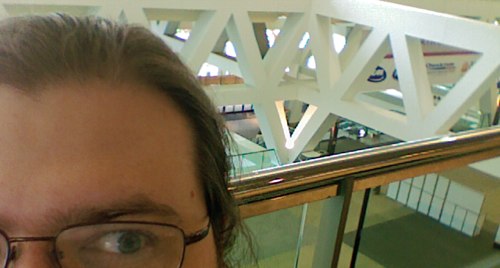 As I was presenting these myself, I wasn't actually taking the time to give a play-by-play in Plurk. You can see my wikis for Session 3 and Session 4 if you want my take on them, though.
As I was presenting these myself, I wasn't actually taking the time to give a play-by-play in Plurk. You can see my wikis for Session 3 and Session 4 if you want my take on them, though.Another option would be to check out Selena Ward's Plurk log of my Session 3 and someone else's Session 4 (She didn't attend mine because she's already a PLN master). Good stuff, there.
MICCA09 Session 2 Plurk Log
theartguy MICCA Session 2: "Gaming: How do I get Started?" with Dr. BJ Gallagher
- April 21, 2009 at 11:31 theartguy says Came up with using games in education while working with special needs kids.
- April 21, 2009 at 11:33 theartguy says Most games are "Drill & Practice," others are a little more adventurous.
- April 21, 2009 at 11:34 theartguy says "Complex Games" are the way to go, though there is a learning curve for some.
- April 21, 2009 at 11:36 theartguy says "If a student's in a wheelchair, they can pick an avatar that can get up and move!"
- April 21, 2009 at 11:37 theartguy says Mention of Runescape - she was cooking shrimp in the game and fought a troll. Heh.
- April 21, 2009 at 11:39 theartguy "If you want to get started find yourself a middle schooler. Not a high schooler they know too much." :D
- April 21, 2009 at 11:41 theartguy Somewhat brief mention of MMORPGs while looking at Wikipedia article on gaming.
- April 21, 2009 at 11:43 theartguy says I'm somewhat confused - not about the gaming, but about the presenter's enthusiasm. She seems enthusiastic ... but not.
- April 21, 2009 at 11:44 theartguy says Universal Design for Learning, Differentiated Instruction, games can be used to support these systems.
- April 21, 2009 at 11:48 theartguy says "How are our games perceived around the world?" A good point is made here, some of our games don't fit well with other cultures.
- April 21, 2009 at 11:49 theartguy says World of Warcraft removed a character based on a panda because China didn't think it was a positive image.
- April 21, 2009 at 11:52 theartguy says I see how gaming can be used to assist education, but she could be making the connections better than "Here's some links on some sites."
- April 21, 2009 at 12:38 theartguy says Next two sessions are mine - think my audience will mind if I stop to Plurk? ;)
MICCA09 Session 1 Plurk Log
theartguy Session 1 is What Google Can Do For You by thetechtiger! Woot!
- April 21, 2009 at 10:38 theartguy says For now at least - don't want to confuse the people I introduce to PLNs today.
- April 21, 2009 at 10:43 theartguy says It's all a quick overview of everything right now. Cal, Docs, Maps, Earth
- April 21, 2009 at 10:44 bethmharvey says I love the site "text the mob" I have never seen that. Good luck on your presentation. Our teachers are most interested in Google Docs
- April 21, 2009 at 10:45 theartguy says "If you can use Office, you can use Google to make web pages." So true :)
- April 21, 2009 at 10:47 theartguy says Best part about Google Docs is no more thumb drives to transfer documents. IMHO
- April 21, 2009 at 10:47 theartguy says Side note - this isn't a PowerPoint. WHole thing is in prezi.com/
- April 21, 2009 at 10:49 theartguy says Google Groups - discussion boards. Can be public or private. Lots of good ones already exist.
- April 21, 2009 at 11:02 theartguy says Form - create a web based survey (or quiz or test!) and all answers are placed in a spreadsheet! I use this all the time and it's awesome.
MICCA 09 Keynote Plurk Log
theartguy Keynote for Day 1 is Karen Cator from Apple. Lots of good ideas, though many are common amongst keynoters.
- April 21, 2009 at 09:17 theartguy says "Get out of the notion of giving kids something to do every 20 minutes." They need to manage their own time.
- April 21, 2009 at 09:22 theartguy says Showed a video of a 10 yr old video blogger. Kid mentioned a JoCo song. Nice :)
- April 21, 2009 at 09:24 theartguy says Enabling trends: Mobility - 24/7 access & user created content.
- April 21, 2009 at 09:26 theartguy says Indeed, thetechtiger - It was rather "permanent record"-ish, but in a good way.
- April 21, 2009 at 09:27 theartguy says Also enabling: Social Interactions for Learning. Social interactions are PROMOTING learning.
- April 21, 2009 at 09:34 theartguy says And just got a link from timholt about being a Keynote speaker.
Notes from the front lines of MICCA
- I've been Plurking my experiences of the keynotes and sessions. I'll be moving them over to this blog for the sake of those who don't use Plurk but still want to comment or whatever.
- 3rd year in a row that I've been stopped by someone - this time it was just because he thought since registration doesn't open 'till 7:30am today that no one was allowed in until then. (But if I'm not in the parking garage before 7 I don't get the early bird special and save $20.) Simple misunderstanding.
- In addition to the Plurk logs, I've got a new blog post half-written in my head already. Maybe two. Expect more from me soon.
- Same gentleman is now stopping everyone who walks past. Odd that he's stationed in the middle of the conference center and not at the front door. (The guy at the front door just told me good morning and waved me through.) I'm sure he means well.
- I left two things in my car - My MICCA badge (which I went back and retrieved before entering the building) and my soda (which I forgot even when I wsa back at my car). Looks like I'm drinking water today. Eh, that's healthier for me anyway.
- As you can see from the above picture, Baltimore Convention Center is full of triangles. I love this place.
Monday, April 20, 2009
Help me at MICCA!
For the 4th year in a row, I will be presenting at MICCA.
For the 1st time (for this conference, at least...), I will be presenting twice.
And as usual, I'm opening my handouts up to everyone who wants to add in their two cents. I feel they're ready to go as-is, but that doesn't mean I'm the only person who knows what he's talking about! (I'm hoping for supplementary information, not for someone to do the work for me.)
My presentations are as follows. Click the links to see, edit, and/or add to my wikis:
Art 2.0
...how art lessons in the computer lab can reinforce other subjects.
Paper, pencils, and paints are good, but there are also plenty of free art projects that reinforce other subjects and can be taught using just computers. This session will showcase some tools, tips, and tricks that any teacher can use.
Personal Learning Networks
...how microblogs and more can make you a better teacher.
Personal learning networks (also called professional learning networks) are a quick, easy, and free way to continue your professional growth as an educator using web 2.0. This session will explain PLNs in more detail and show a variety of free sites that can be used to build your own.
Monday, April 06, 2009
What can I do with these? Review
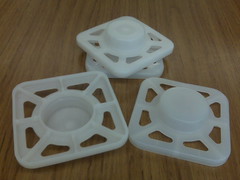 The first WCIDWT was posted entirely on a whim. The tech person at one of my schools gave me some interesting pieces of plastic, and the pack rat in me just couldn't say no.
The first WCIDWT was posted entirely on a whim. The tech person at one of my schools gave me some interesting pieces of plastic, and the pack rat in me just couldn't say no.Of course I had no idea what to do with them, so I snapped a quick picture with my BlackBerry and used Flickr to post the photo and my description/question to this blog. The whole process took less than 5 minutes, but the responses were nice enough that I ended up using the same post as a warm-up for my Art Club.
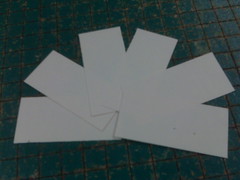 Part 2 was a similar situation, except that the source was waste scrap paper that was just too small for most of the projects I've done with my students. Again, 5 minutes of work yielded some awesome responses from both the followers of this blog and my Art Club.
Part 2 was a similar situation, except that the source was waste scrap paper that was just too small for most of the projects I've done with my students. Again, 5 minutes of work yielded some awesome responses from both the followers of this blog and my Art Club.So ... I think I'm going to keep this up. As I find new, unusual, unorthodox, or just plain industrial waste materials, I'll post a picture and brief description and ask for your insights.
Creativity can be an awesome thing. It can be even more awesome in a group setting.
Wednesday, April 01, 2009
What do I do with these? (Part 2)
They are scraps from old manilla folders. They measure 2.5" x 1". I have enough to supply a whole grade level with several or a single class with a lot more. (I could always cut more if needed.)
I have a few ideas, but would like to hear yours first.
Sent from my Verizon Wireless BlackBerry
Monday, March 30, 2009
Don't mind the shavings.
 [/caption]
[/caption]I handed colored pencils to my 1st graders today.
This was not too surprizing, as I did the same thing last week. What I have noticed, however, is that most of my teachers with younger students don't let them sharpen their own pencils whenever they need to.
I, however, do. I would much rather see a student raise their hand because they're having difficulty with a portion of their composition than because their colored stick isn't pointy enough. As a result I usually announce in the beginning of the lesson that if the pencil needs sharpening, they can just get up and sharpen it. I even go so far as to explain when a pencil needs sharpening and how to sharpen it so that it doesn't disappear forever in a pile of shavings. (Colored pencils are much softer than the 2B kind.)
You know what happens next...
[caption id="" align="aligncenter" width="500" caption="Stampeeeeeede!"]
 [/caption]
[/caption]That's right, any student who found a colored pencil that was not ready to vanquish a vampire was at the sharpener ready to go! This included those who had white colored pencils. Did I mention this was a lesson where they used white paper? Well it was.
This is the point when the classroom teacher looks at me with a patronizing expression that says "That's why I don't let them do that."
And I look at them with a nervous smile that says "Eheheheh ... I'll be right back."
The next minute or so is spent turning kinds away that don't really need to sharpen pencils, as well as enforcing the "Turn it 3 times then check" rule of sharpening.
And you know what? That's it.
Occasionally a student will have a relapse, but for the most part they know my rules and what's expected of them. They're fine with that because they're getting a cool reward in the process - an awesome art project.
In fact, I wouldn't be surprised if the initial stampede was in fact because they wanted to revel in the idea that they could go and sharpen any pencil that needed it.
So how does this relate to technology integration?
You have to ask?
A new tool is a new tool, and new freedoms are promptly exercised. There will be chaos, but if you stay alert it will at least be organized chaos and learning will still be accomplished. Eventually, the chaos will be replaced with something better - a class full of students who are able to learn without raising their hands to ask permission for each step.
Sunday, March 29, 2009
Fluid: Less is more.
 Here's one more tool that I wish I could use at school but can't because our computers are mostly all Windows: Fluid.
Here's one more tool that I wish I could use at school but can't because our computers are mostly all Windows: Fluid.Nowadays whenever my Art Club meets I send them to the art club website. In my infinite wisdom I used my academicaesthetic.com domain name to host the club's blog, which as the year comes to a close is still causing issues due to students having trouble spelling "aesthetic." (To be honest if I wasn't an art teacher I'd have problems with that word as well.)
There are many ways to solve this problem. For me, I gave them cards with the URL written out. If half of them can spell "aesthetic" by the end of the year I'll be very happy.
Fluid would have been another possibility too. The app you download does nothing more than create other apps, each of which is a minimalistic web browser. What's the big deal, you ask?
The big deal is that there's a ton of cool websites out there that are applications in and of themselves. SUMOpaint, Google Docs, and more are all as good as or better than applications you can run on your computer. If I create a SUMOpaint app, Twitter app, or whatever using Fluid, I can have a new icon in my dock that with a single click takes me right to that tool.
Not convinced this is a good thing? Neither was I, at first. But because Fluid apps are very minimalistic, they're also kinda light on the system requirements. If I'm running something that's kind of resuource heavy on my computer, say... World of Warcraft, do I really want to open up a full browser just to check wowwiki.com?
If I have a Twitter account of my own and manage another Twitter account for a community, do I want to open up a whole other browser just to keep from logging in and out of multiple accounts? Yeah, I could use one of many twitter apps, but I kinda like the background I have on my Twitter page. I'd like to see that.
I won't be so enthusiastic as to say Fluid's posibilities are endless. Clearly it has some limitations, but I see those same limitations as its strengths.
If you have another use for Fluid, why not post it as a comment?
Tuesday, March 10, 2009
I'm not sayin'.
 Dan Meyer seems to have come across a recent theme in his lessons: he's not giving them the answers. I think that's awesome.
Dan Meyer seems to have come across a recent theme in his lessons: he's not giving them the answers. I think that's awesome.This is something you could very well expect to see in any art class that has a good teacher, since in art you will often find three or four (or more) opinions about composition, color choices, techniques, or even the definition of "art" itself. We can't give a single answer because there isn't one. We're kind of forced into the scenario of not giving an answer at the end of the lesson that students can expect to see on the final.
Mr. Meyer, however, is a math teacher. There are very concrete answers that can be figured out when encountering math problems. Two plus two has an answer. If solving for X yields more than one possibility, you can graph them to show the whole range.
Sometimes the conversation, the act of sorting things out with your peers and learning for yourselves what the right questions are is more important than coming to a specific teacher-sanctioned conclusion.
Giving an answer at the end can disguise that simple fact. I'm glad he's realized this so early - I know more than one teacher twice his age who's yet to have that sink in.
Sunday, March 08, 2009
What's in a name?
 I have over 2,000 students (not including teachers who are also, technically, my students) spread out over three schools. This is a daunting task for many reasons, but only one of them irks be to the point that I'll mention it at the start of this blog post:
I have over 2,000 students (not including teachers who are also, technically, my students) spread out over three schools. This is a daunting task for many reasons, but only one of them irks be to the point that I'll mention it at the start of this blog post:I can't remember that many names.
Oh, I'll make valiant attempt. There's a handful of students whom I do know by name, but there's just no way I can learn who everyone is when I see them so rarely.
They do know mine though ... well, most of them. To some of my students I'm "Mr. Smith." To others, I'm "The Art Guy." At the insistence of some teachers in one of my buildings some call me "Mr. Aaron," though I'm not too keen on that.
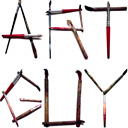 In any case, I've been thinking a lot lately about my "Art Guy" moniker. Originally it was a name given to me by a student, and it sort of stuck. It smacks of just enough irreverence to make it amusing to me even though some classroom teachers who don't know me try to correct their students when they hear it.
In any case, I've been thinking a lot lately about my "Art Guy" moniker. Originally it was a name given to me by a student, and it sort of stuck. It smacks of just enough irreverence to make it amusing to me even though some classroom teachers who don't know me try to correct their students when they hear it.It's a great nickname to have when you're the only art teacher around, or failing that the only one that's a guy. For that very reason when I started my first forays into edublogging and podcasting to find there were no other art teachers playing with the same technology that entertained me so much (at least none that I saw...), "theartguy" seemed like a perfect screen name for me.
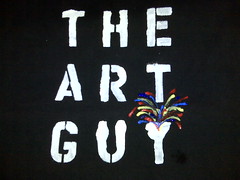 And it has been. I have found countless friends and joined more Web 2.0 sites than I can remember using that screen name. It's how I'm identified by pretty much anyone on the internet who knows me. My target audience has never been limited to just other art teachers - far from it in fact, because in the beginning it was such a rare occurrence to find one of us blogging.
And it has been. I have found countless friends and joined more Web 2.0 sites than I can remember using that screen name. It's how I'm identified by pretty much anyone on the internet who knows me. My target audience has never been limited to just other art teachers - far from it in fact, because in the beginning it was such a rare occurrence to find one of us blogging.But times change. These days I'm far from being the only artsy person out there with a blog/podcast/vidcast/and so on., and I think that's totally awesome. When I got started I brought an art teacher's perspective to these new technologies with which we were playing, because in some cases it was quite different from a [insert any other content area here] teacher's perspective.
Now, the art teachers that are blogging have their own little corner of the internet to form their Personal Learning Networks. Networks where they don't have to start off by saying "As an art teacher...," because their target audience is other art teachers. Again, this is awesome.
But it also means I'm not the only "art guy" out there.
If I walk into a room full of 30 students ready for an awesome painting lesson, I have no problem calling myself the Art Guy. If I walk into a room with a decent percentage of other art teachers ... I hesitate.
There is more I want to say, but this post is long enough for now. Expect another installment later.
Wednesday, March 04, 2009
Prove Me Wrong
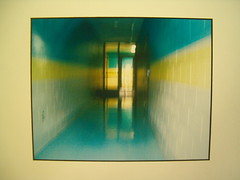 I do the impossible. Daily.
I do the impossible. Daily."He won't do any work. Just let him sit there."
"This class will never be controllable when it's snowing outside."
"These special ed. students don't have the hand-eye communication to use scissors."
Each of these statements is something I've been told by a classroom teacher. Each of these statements have been proven wrong. See that photo? It was taken by a 2nd grader, then submitted to a juried art show. It got in. Don't tell me photography can't be taught to 2nd graders. I could add more examples, but do I need to?
It is a personality flaw quirk of mine to, when I hear something cannot be done in the classroom, see that as a challenge. Sometimes it turns out the chalenge issuer was right, but more often than not I get to show them what a little effort and guidance can accomplish. They had given up on those students because they did not think they had the time and/or the energy to accomplish the aforementioned tasks and teach the prescribed curriculum. Understandable how they got to that point - I'd be there too if I was in their position - but that doesn't mean I'll let it stay that way.
So...
When a classroom teacher tells me they'd love to include more art in their lessons, but they just don't have the time / energy / creativity / inspiration to do that and cover the mandated curriculum....
Challenge issued.
Challenge accepted.
Just don't keep saying it can't be done after I prove you wrong.
Wednesday, February 25, 2009
What have we learned?
I'm spending most of this week organizing, labeling, and hanging pieces for the Youth Art Month Expo's juried art show. It's a lot of work, a lot of fun, and I get to be in the same room as other art teachers. Beware!
While sorting the untold piles of art I couldn't help but think of my own art classes. Not the ones I teach, mind you - I'm talking about back when I was in high school. Back then I was a bit of a geek.
Um, OK, so I still am.
But while now I'm an outgoing extrovert of a geek with an ego larger than the Hindenburg, back then I was an introvert with very little self confidence. The only class where I felt I could really speak my mind was art, and that was because Mr. Lichner promoted the kind of environment where good ideas were rewarded and negative criticism had no place. When one of us came up with an art project that had nothing to do with his idea for what projects he wanted us to do, he still encouraged us to explore the possibilities allowed to us by the media to which we had access.
If all of my classes had been like my art classes, I can assure you my parents would have been much happier with my report cards.
And so, since I was thinking about this, I posed a question to Plurk, Twitter, and a few other outlets.
What's something you've learned from an art teacher?
The results were rather interesting, I thought.
There is no such thing as a mistake, only opportunities to create more. - Laurie Korte
Do the opposite of what you normally do. Completely ended up changing my style and medium. - Judy Shintani
It's all in the details, take a second look, never be afraid of color. - Selena Ward
"There are no mistakes. Only happy accidents." Kindergarten art teacher. She was right. Mostly. - Bud Hunt
You can always throw it out and start over :-D - Jacqui Derby, Ph.D.
To properly observe something, sometimes you need to look closer. - Beka Smith
There is no such thing as staying in the lines.. Patti Duncan
[The] law of perspective. Patti Duncan
Part of me feels the need to comment on each of these individually, but I think it's better to let them stay as-is. What I will say is that each person who responded took something useful and meaningful back with them when they left their art classes.
As the powers that be wring their hands and look at budgets that are stretched too thin to fit everything, it is my hope that they too will remember what they learned in their own art classes.
So what have you learned?
Tuesday, January 27, 2009
What do I do with these?
I have 4 of them. They're hard plastic, @5" across, and fit together. They are packing material for a printer paper that's expensive enough to make me doubt I'll get any more of them.
But they look cool. Any project ideas?
Sent from my Verizon Wireless BlackBerry
Tuesday, January 20, 2009
Susan Benarcik's Paper Spore
So when this showed up in my RSS reader thanks to MAKE Magazine .... well, I had to blog about it.
 This sculpture looks awesome. On top of that, it also looks simple enough to have my younger students recreate something in the same style! I've been looking for ways to incorporate more contemporary artists into my lessons, and this might just be one of the ways to do it. I like her Artist's Statement, too - I'm thinking that paragraph alone could inspire all kinds of cool projects.
This sculpture looks awesome. On top of that, it also looks simple enough to have my younger students recreate something in the same style! I've been looking for ways to incorporate more contemporary artists into my lessons, and this might just be one of the ways to do it. I like her Artist's Statement, too - I'm thinking that paragraph alone could inspire all kinds of cool projects.
The only problems I can really think of right now would involve display, as I would need to make sure the student work was structurally sound enough to hang from the wall and not fall apart.
Still, with 20+ students working on the sculpture we'd be able to make something pretty neat looking no matter how long it lasts.
Wednesday, January 14, 2009
I know too much.
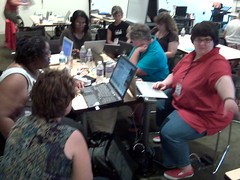
The class ended in December, and I began looking forward to all the "free time" I would have. "Free time" is in quotes, of course, because my time was not actually free before I enrolled in that course. I simply put off some responsibilities for others. You may have noticed I'm blogging a little more now - that's one thing I'd been neglecting, and I apologize for that.
Unless you liked the fact I was blogging less, and in that case I'd apologize for my return to the blogosphere if I wasn't wondering why you're reading this in the first place.
*Ahem.* Let's move on.
As I'm getting back into the swing of things I'm noticing that conference season is in full swing. MICCA's deadline to submit presentation proposals is almost here, NECC is local-ish this year, and PETE&C is just around the corner.

That brings my rambling to a topic worth discussing. Every year the Discovery Education Network runs a day long pre-conference for PETE&C. I've attended more than once, and every time I felt it was worth it. Forget the fact that it's held in Hershey, PA, a town that smells like chocolate for very obvious reasons, it's also free for DEN Star members. I've held that status for a while now, as do many of my friends who I will only get to see in person at events like this.
And I'm thinking of not going.
It's not because of my wife's health. Though she's not at her best right now, I honestly think she'd enjoy and benefit from a weekend out of the house. (Though I shudder to think how much money she'd spend in Hershey, that's only me fulfilling my stereotypical duty as a husband.)
It's not because of the cost. Gas prices are relatively down, and I have family that's somewhat close to Hershey where we could spend a night or two if needed. I'm not attending the full PETE&C conference anyway, so that price isn't even a factor.
It's because I'm not sure how much I'd learn.
OK, that sounded like a jab against the DEN, so let' take a moment to explain it a little better.
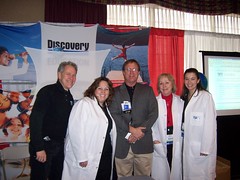
On the grand scale of technological geekery (yes, I made that word up), where a 1 means I have trouble checking my email and a 10 means I can whistle into a phone line and get a 56k connection, I'm about a 4. To people who rank 1 or 2 I appear to be a 10, but I know better. Right now I'm at the stage where the more I learn, the more I find out how much I don't know. It's exciting and depressing at the same time, because I really would like to know everything.
... but maybe not reach 10 on that scale - I can't whistle very well.
Back on topic. The DEN is awesome because they take teachers, many of which are 1 and 2 on the aforementioned scale, and turn them into 3s and 4s.
But I'm already a 4, which means I'm not learning as much. Google Earth is great, but I don't need to see another workshop that explains why it's great.
The DEN blogs? An awesome, free service that's worth checking out. When new features are added I like to know about them, but that's because I want to know if I should install them on my own blog.
Discovery Education Streaming? The Builders? Microblogging? Digital storytelling? I could go on, but I don't need to. There's more I could learn on each of these topics, but I strongly doubt I would learn much because I'm not the DEN's target audience at this pre-conference.
If I did go, it would be to socialize. To see people face to face that I haven't seen in months if not longer (and in some cases never, much to my regret...), and to share with each other what we've learned and experienced over that time. I'd like to do that. To me it's one of the most enjoyable parts of a conference - any conference.
But if I do that, I'll probably be filling up a spot that some one else could have used. Someone who may very well need the DEN to teach them the things that I already know enough about to run my own workshops.
I don't think that would be fair to them.
So I really hope those of you that will be at PETE&C this year will be liveblogging it, if for no other reason than to let me live vicariously through your posts. You don't have any excuse not to, since you already have a blog provided to you by the DEN.
I'll be watching.
Monday, January 12, 2009
I
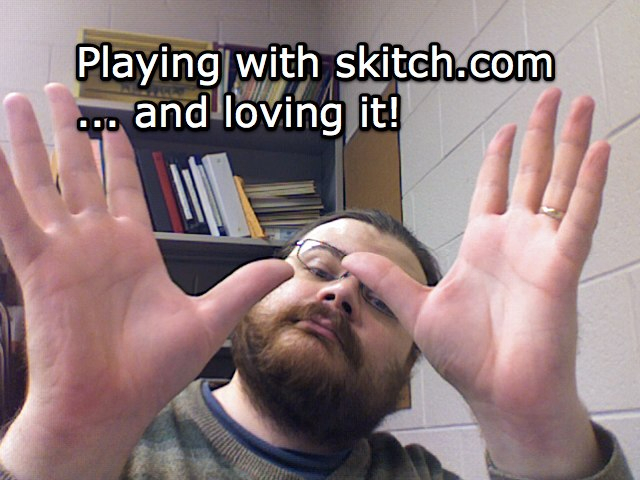 Every now and then a program comes along that is so fantastic, so perfect for what I do in the classroom, that I can't help but use it. Skitch is one of those programs.
Every now and then a program comes along that is so fantastic, so perfect for what I do in the classroom, that I can't help but use it. Skitch is one of those programs.

I first found out about it when Bre Pettis started posting drawings he'd made using the program. Intrigued, I downloaded it, played with it, fell in love, and used it in one of my classes the same day. Not only was it that easy to use, it was appropriate, too.
Skitch has a variety of options out of the box. I can start with a blank image, take a screen capture of any size or portion of my screen, drag in a preexisting image, import something from my iPhoto library, or even use my laptop's built-in iSight camera to snap a picture of myself. That image, whatever it's source, becomes the background layer.
[caption id="attachment_668" align="aligncenter" width="500" caption="(The quick math on the side shows the years between the event and the painting.)"]
 [/caption]
[/caption]On top of that layer I can draw, write, annotate, highlight, whatever, using a small selection of tools. Since all of this is on a layer on top of the image I can erase or cover up without fear of destroying the original image.
When I'm done I can upload the image to Skitch's own servers where it'll give me a Flickr-esque code I can use to insert it into webpages. Got a .Mac MobileMe account? It can upload them to there instead if you want. You can even drag the picture to your desktop if you decide you want to upload it through a different service, or simply not upload it at all.
As much as I'm loving Skitch, it's not all things to all people. As of now I can't have it record video through my webcam - still photos only. For quick video on the Mac Photo Booth and iMovie are still the way to go.
Have an older Mac or (oh no!) a computer running Windows? You're out of luck - Skitch will only run on Mac OS 10.4.6 or later.
The drawing tools are also very limited. Adequate for underlining, circling, and so on, but GIMP and SUMO Paint are much more advanced with a wide variety of features.
Text can be added quickly and easily, but there's a limit to how large or small I can make it and I still haven't figured out if I have any control over the font.
With all these negatives, why do I bother to use Skitch? Because it's the best at what it does - selecting an image and building upon it quickly with minimal effort. All the times I used GIMP in the classroom no teacher ever asked me where I got such a full featured application. Sure, I COULD do the same stuff with GIMP or Photoshop, but that would be like using a car to visit your next door neighbor. In most cases walking (& using Skitch) is simpler and faster.
Most teachers ask me about Skitch when they see me use it, because the interface is non-threatening and they see immediately how it can be used to reinforce their teaching styles.
It's a shame they all have Windows based laptops.
Friday, January 09, 2009
Mistakes were made.
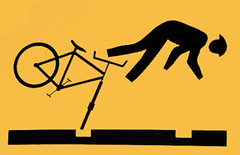 Welcome to 2009, a brand new year with new possibilities, new opportunities, new experiences, and the same old mistakes.
Welcome to 2009, a brand new year with new possibilities, new opportunities, new experiences, and the same old mistakes.And more often than not, all of those things happen at the same time.
I have a habit of mine. A bad habit, if you will. A deep, dark secret that will no doubt haunt me as I'm now casting it out amongst the sea of the interwebs.
Sometimes I expect too much from my students.
I'll take a moment for all of you to let that sink in and then collectively gasp at that realization. It's truly shocking, isn't it?
Now this is not an every day occurance, mind you. While I'll often have high expectations for my students, they tend to rise up and meet those goals. It's amazing what kids can do if you just give them the opportunity. However, every practice has a chance of failure.
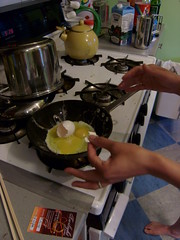 Case in point: Yesterday I took a 6th grade class to the computer lab to make ads for a fictional recording studio. The whole lesson was meant to build upon their persuasive writing lessons in language arts. I've done similar lessons in the past, but always in the classroom. Always with the more "traditional" art supplies. Markers, crayons, colored pencils, those media are familiar territory to students.
Case in point: Yesterday I took a 6th grade class to the computer lab to make ads for a fictional recording studio. The whole lesson was meant to build upon their persuasive writing lessons in language arts. I've done similar lessons in the past, but always in the classroom. Always with the more "traditional" art supplies. Markers, crayons, colored pencils, those media are familiar territory to students.Computers are ... less so. Granted, students can learn new technology quite fast when given the opportunity, but there is a limit to that speed, and yesterday I pushed it. While I'm certain every student in that room was capable of doing everything I wanted, most could not do it in the time I was able to provide. There were just too many new concepts to fit into too short a time.
Good work was done (and is still being done, from what the 6th grade teacher has told me), but we didn't even get to upload our pictures to the wiki as I had originally planned.
So ... what do you do when you find yourself in a situation like this? Short term, cut like crazy. decide what elements need to be covered right then and leave the rest out. If it's something you can continue later, save it for later. If you know you just won't have the time to revisit it, make the best of what can be done in the time you have.
Long term, reevaluate. Not just the lesson, but the media used and the genre of that lesson as well. With that class, I shouldn't have used SUMO Paint. Don't get me wrong, SUMO Paint is awesome - but it was too much "new" in not enough time. They'd just finished a PowerPoint project. Having them build the ad on a single slide would have meant spending a lot less time on how it's done so I could focus more on why we were doing it.
I'll admit, in this case my bias against the ubiquitous nature of PowerPoint got the better of me when planning the lesson. I wanted to show them something new and novel, and as a result I cost them valuable project time.
Was the lesson a loss? No. Even though we didn't do every step I wanted to cover, they managed to explore an unfamiliar media (one of the objectives of my state's art curriculum) and learn more about how advertisements grab your attention in order to persuade you (tying in with the state's language arts curriculum).
Mistakes were made, but we learned from them.
And next time, it will be better.
